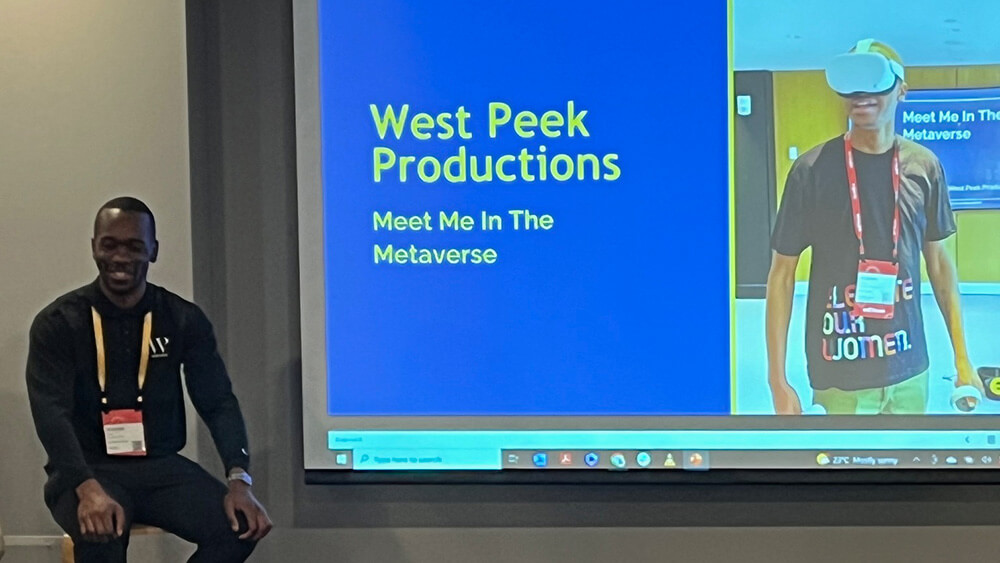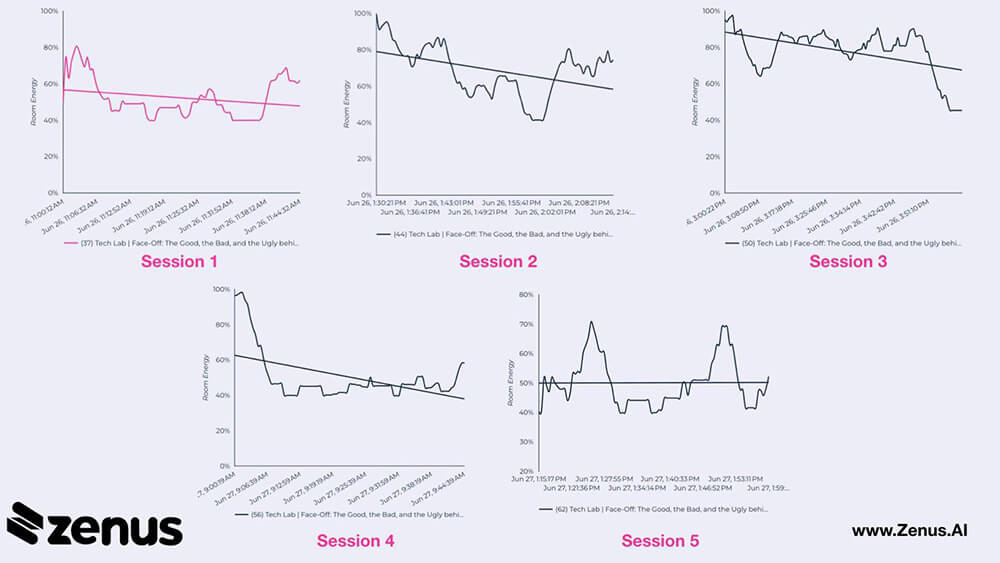
Scooter Taylor, founder of West Peek Productions, talks about the potential of the metaverse for events during one of the tech labs at PCMA EduCon 2023 in Montreal.
The prospect of learning new event technology can cause planners to experience everything on the spectrum — from eager anticipation to having valid concerns to being deeply anxious. However, within each novel solution lies the potential for efficiencies, greater engagement among participants, and an overall better experience for the organizers and all event stakeholders.

Shawn Cheng and Anh Nguyen
It was in that spirit — exploring positive outcomes — that six different tech solutions were presented during the Event Tech Lab sessions at this year’s PCMA EduCon, June 25-28 in Montreal. Recently, Convene shared how Anh Nguyen, founder of Spark Event Management, and Shawn Cheng, event strategist at Curious Bear Management, made the interactive sessions a learning opportunity for both planners and tech providers. Here’s how the different solutions presented shake out, according to a recent conversation Nguyen and Cheng had with Convene.
Before EduCon, Cheng was most intrigued by Gevme’s Spark AI, while Nguyen, “a big proponent of technology making networking better,” was eager to see Captag’s solution Badgee in action. In his post-con review, Cheng said that he felt the sessions were a bit too information dense, leaving little room for play. But as a frequent user of Spark AI, (“the AI tool developed by eventprofs for eventprofs,” according to Project Spark’s website), and an organizer who is well-versed in event technology, he recognized that he is not representative of all planners and so his criticism likely wasn’t shared by the audience. And, in fact, most of the feedback he heard from participants was that they appreciated both the time taken to explain each tech tool and that use case examples were provided. What Cheng felt was lacking was the spark that would turn participants’ curiosity into a sense of “I need to use this right away!” urgency.
Badgee, Nguyen’s pre-con top tech choice, is a smart badge “that can exchange information and group people based on certain attributes” that delegates fill out in advance, she said. She was no less keen on Badgee after the Tech Lab session, even if it is “not developed enough for mass product market usage. Delegates leaving the sessions shared Nguyen’s enthusiasm for the badges, Cheng said, as he overheard their comments that they could see a clear application of this tech at their events.
Cheng left EduCon excited about ARHT Media’s Hologram and Capsule technology — “the first time that I had the chance to learn a little more about them,” he said. Despite the fact that it was clear that this technology had the biggest wow factor among EduCon participants, he acknowledged that its cost could be a barrier to entry for a variety of events.
Nguyen, a skeptic of facial recognition technology at first, had a change of heart when she stepped into the role of moderator for the Zenus facial analysis tool sessions alongside the company’s marketing director, Nick Borelli, and cofounder and CEO Panos Moutafis, Ph.D. She said that she witnessed firsthand the tool’s potential, and a positive audience sentiment analysis showed she was not alone. She is already thinking of ways to use the facial recognition tool at her events, especially since its price tag is not restrictive for her clients. “I love it when things can change my mind,” she added.

The Zenus facial analysis tool recorded the sentiment of the audiences during some of the tech labs.
Scooter Taylor, founder of West Peek Productions, showcased the potential of the metaverse for events. The metaverse was a big industry buzzword just months ago, but the spotlight is now more on AI, Cheng said. Even if he doesn’t see that AI will continue to be all the rage next year, he said he recognized that the real difference between the metaverse and AI is the adoption rate — AI’s being “way higher than the metaverse.” But with a wildly unpredictable future, Nguyen and Cheng think event professionals should still keep the metaverse under consideration as a potential tool.
The Tech Labs featured a session on augmented reality (AR) technology’s role in the events landscape, led by an expert from Encore. “Immersive experience” was Cheng’s anticipated standout technology for the future, since AR and VR (virtual reality) options could provide alternatives for delegates who can’t or won’t travel due to rising costs and climate concerns — with Nguyen’s caveat that the experience surpasses the “Zoom stream.”
In terms of other promising technology solutions, Cheng said registration options featuring tools like Apple Vision Pro are on the horizon. Meanwhile Nguyen has her eye on “connection technology,” expecting it to enhance event experiences as the post-COVID “reunion factor” fades.
Magdalina Atanassova is digital media editor of Convene.
